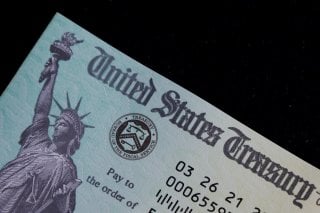Forget Your $1,400 Stimulus Check. Some Countries Are Giving Way More.
In Europe, France guaranteed 70 percent of workers’ wages if they had to deal with shutdowns or reduced hours, and the UK government covered up to 80 percent of wages that were capped at $3,000 per month.
The Internal Revenue Service already has sent out a hundred twenty-seven million coronavirus relief checks—totaling roughly $750 billion—and the funds could potentially be a lifesaver for many financially struggling Americans.
Know that to date, Congress has green-lighted the delivery of three stimulus checks to most Americans—a $1,200 check in April 2020, $600 in December, and the current $1,400 payments under President Joe Biden’s American Rescue Plan.
“The discretionary response is very large in the United States but when you’re comparing you need to take into account that actually more needs to be done in the U.S. because the social safety nets are smaller,” Paolo Mauro, deputy director of the International Monetary Fund’s fiscal affairs department, recently told the BBC.
With this in mnnd, some are wondering whether other countries are also utilizing direct payments to citizens to help lift their respective economies out of the grips of the ongoing pandemic.
Yes, there are other large economies that have given out stimulus payments, but most European countries have tapped into a more targeted approach with employment wage protection schemes.
As for the direct payments, Japan gave out more than $900 to all citizens, Brazilian President Jair Bolsonaro put $110 per month into many of the country’s poorest families, and South Korea’s government sent $820 checks to families in the bottom 70 percent of income brackets.
In Europe, France guaranteed 70 percent of workers’ wages if they had to deal with shutdowns or reduced hours, and the UK government covered up to 80 percent of wages that were capped at $3,000 per month.
Australian employees were paid about $2,000 per month if they worked at a company that lost more than 30 percent of its revenue. And in Canada, the government offered about $1,500 per month to support workers who had their hours reduced by more than 50 percent.
Still, here at home, there are millions of Americans who haven’t yet received their third stimulus check. The IRS has noted that for this particular batch of Economic Impact Payments, what’s noticeably different is that it includes a large number of paper checks and prepaid debit cards—which could potentially take weeks to be delivered to mailboxes.
Nearly fifteen million paper checks totaling $34 billion and five million debit cards totaling $11 billion have been mailed to Americans who haven’t received the stimulus funds via direct deposit.
Under the American Rescue Plan, individuals who earn as much as $75,000 in adjusted gross income (AGI), or couples making $150,000—in addition to their children or adult dependents—qualify for the full $1,400 per individual. The payments, however, phase out much more quickly than in previous rounds—an individual with an income of $80,000, or a couple with $160,000, will receive nothing.
Ethen Kim Lieser is a Minneapolis-based Science and Tech Editor who has held posts at Google, The Korea Herald, Lincoln Journal Star, AsianWeek, and Arirang TV. Follow or contact him on LinkedIn.

